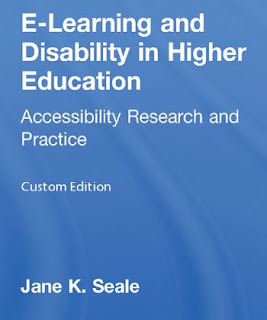Well, the one thing I can do, is start reading the set book and make some notes as I go. Hopefully, that means I won't have to spend as long reading later on. So let's start with a quick overview of the set book.
You'll notice that this is a custom edition. It's a combination of the second edition, with three chapters from the first edition. Looking ahead, I think the End of Module Assignment (EMA) is based on those three chapters.
The book is in four parts:
- Contextualising the scene
- Surveying the scene
- Critiquing the scene
- Re-imagining the scene
I'm assuming 'the scene' is the world of e-learning, as it relates to disabled students.
As I suspect this book will be often quoted in assignments, it would be sensible to know how to reference it using Harvard referencing, OU-style.
| In-text citation | Full reference |
|---|---|
| (Seale, 2014) | Seale, J. K. (2014) E-learning and Disability in Higher Education: Accessibility Research and Practice (2nd edn), [ebook reader], Abingdon, Routledge. |
In the preface, we find that the first edition was written seven years before the second edition. The purpose of the second edition is to "critically examine whether or not accessibility research and practice has significantly advanced" (Seale, 2014) in that time. Honestly, you'd like to hope so but I suspect it hasn't advanced as significantly as it should have done.

Hi Nicki
ReplyDeleteI like your comment that you'd like to hope that accessibility research and practice has moved on in 7 years. Will be interesting to see whether this is actually the case !
Ruth
I suspect we can already guess at the answer to that... ;)
Delete